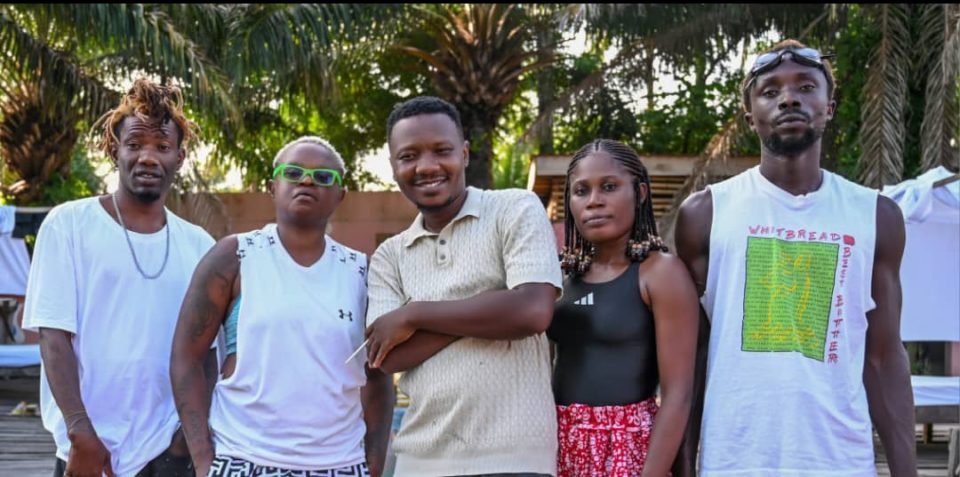By Osa Mbonu-Amadi
In 2019, after facing criticism from netizens for crossing the legendary River Nun to Bumoundi on a rustic fisherman’s boat without a lifejacket to cover the burial of the renowned poet Gabriel Okara, I was understandably hesitant to embark on another boat journey. This time, my destination was Tarkwa Bay, a man-made island off Lagos, where five visual artists were concluding a two-week art residency. The thought of crossing Lagos Harbour on a rickety boat once again stirred some nerves, but as a journalist—and like a soldier—I reminded myself that duty must never be shirked out of fear.
Accompanied by my colleague, I boarded the boat and braved the waters to Tarkwa Bay. Upon arrival, we were warmly welcomed by the residency’s curator, Adebimpe Owoyemi, who guided us to the wooden house where the artists—Josiah C. Josiah, Olúbùnmi Atere, Darlington A. Chukwumezie, Olorunyemi Kolapo, and Elizabeth Chioma Ekpetorson—were staying. The Farmhouse Residency, which began on May 18 and was set to conclude on June 1, 2025, centered its theme around environmental consciousness.
We sat down with the artists to learn about their works and the inspirations behind them, each piece reflecting unique perspectives shaped by the residency’s environment.
Josiah C. Josiah was immersed in creating ten paintings on canvas. His work was inspired by the phrase, “I de fear water,” a common expression he hears. Josiah’s paintings serve as a powerful critique of environmental pollution, emphasising the urgent need to preserve our surroundings. “We cannot do without our environment,” he said. “We need to protect it—from satchet water bags and PET bottles to the waste carelessly discarded into gutters or the ocean shore, especially here at Tarkwa Bay.”
Olúbùnmi Atere, a conceptual and contemporary artist primarily known for ceramics, took an innovative turn by working with jute sacks and found materials gathered from the island. One of her standout pieces, Encounter of Gazes, explores the contrasts between the bustling transportation and commerce passing through Tarkwa Bay and the lives of those who reside there. “The sack is a perfect material to capture this journey,” she explained. “I created an eye to honor the spirituality of this place—a living archive that invites interaction and reflection.”
Darlington A. Chukwumezie is unique among the group as a resident of Tarkwa Bay. His art workshop, organically integrated into the beach environment, serves as a creative haven where he transforms recycled materials—such as floaters, doll babies, and fishing nets—into compelling installations. Darlington’s approach is hands-on and community-oriented. “I wake up early to collect materials washed ashore, often bringing local children with me,” he shared. “I teach them why it’s important to pick up these objects and not pollute the ocean. The results are encouraging, and I intend to keep educating.”
Olorunyemi Kolapo described himself as a science-inspired artist. He ingeniously repurposed a discarded satellite dish as a canvas, painting the bust of a young African woman. His work symbolises signal, identity, and beads, evoking both beauty and a somber reminder of bondage. “The futuristic necklace in the painting looks like a form of bondage,” Kolapo reflected. “It reminds me of the era of slavery. Using the satellite dish connects to the idea of signal and communication.”
Elizabeth Chioma Ekpetorson focused her series of up to ten works on Tarkwa Bay’s old, abandoned lighthouse. She lamented its dilapidated state, seeing it as a metaphor for Nigeria’s broader neglect of cultural heritage. “The lighthouse should be a tourist attraction,” she said, “but sadly, it reflects our poor maintenance culture. It stands for other monuments that have been left to decay.”
Curator Adebimpe Owoyemi opened the residency by emphasising its dual goals: to stimulate artistic creativity and to raise environmental awareness. She expressed satisfaction that the artists had successfully engaged with critical themes such as environmental conservation, human development, and cultural preservation through their works.
Owoyemi explained the choice of Tarkwa Bay as the residency site and the focus on environmental issues as particularly timely. The island faces serious challenges, including oil spills from illegal bunkering, poor waste management, and pollution—all threatening the sustainability of local livelihoods.
Praising the artists for their dedication and focus, Owoyemi affirmed that future editions of the Farmhouse Residency would continue to nurture artistic growth and social engagement, fostering a deeper connection between art and community.


